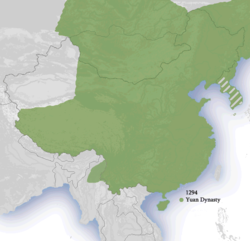Korea under Yuan rule
| Korea under Yuan rule Zhengdong province 征東等処行中書省 |
|||||
| Vassal of the Yuan dynasty | |||||
|
|||||
| The client state Goryeo in modern Korea within the Yuan dynasty, circa 1294. | |||||
| Capital | Kaesong | ||||
| Government | monarchy, vassal to the Yuan monarchy | ||||
| History | |||||
| • | Mongol invasions of Korea | 1231–1259 | |||
| • | Established | 1270 | |||
| • | Mongol invasions of Japan | 1274, 1281 | |||
| • | Disestablished | 1356 | |||
Korea under Yuan rule refers to the domination of the Yuan dynasty over the Korean Peninsula from approximately 1270 to 1356. In the history of Korea, following the Mongol invasions of Korea and the capitulation of the Goryeo dynasty of Korea in the 13th century, Goryeo became a semi-autonomous vassal state and compulsory ally of the Yuan dynasty for approximately 80 years. The ruling line of Goryeo was permitted to rule Korea as a vassal of the Yuan, but members of the royal family were taken to Mongolia, raised there, and typically married to spouses from the Yuan imperial house. As a result, princes who became monarchs of Goryeo during this period were effectively imperial sons in-law (khuregen). Yuan overlordship ended in the 1350s when the Yuan dynasty itself started to crumble and King Gongmin of Goryeo began to push the Mongolian garrisons back.
The Mongol Empire launched several invasions against Korea under Goryeo from 1231 to 1259. There were six major campaigns: 1231, 1232, 1235, 1238, 1247, 1253; between 1253 and 1258, the Mongols under Möngke Khan's general Jalairtai Qorchi launched four devastating invasions in the final successful campaign against Korea, at tremendous cost to civilian lives throughout the Korean Peninsula. The Mongols annexed the northern areas of Korean Peninsula after the invasions and incorporated them into their empire as Ssangseong Prefecture (雙城摠管府) and Dongnyeong Prefecture (東寧府). In March 1258, the dictator Choe Ui of the Goryeo military regime was assassinated by Kim Jun, ending the Choe military dictatorship of Korea; after this, scholars who had insisted on peace with Mongolia gained power. This party sent an envoy to the Mongols, and a peace treaty was contracted between the Mongol Empire and Goryeo, part of which stipulated that Korea was to accept vassaldom to the Mongol Empire. Some military officials who refused to surrender formed the Sambyeolcho Rebellion and resisted in the islands off the southern shore of the Korean Peninsula.
...
Wikipedia

